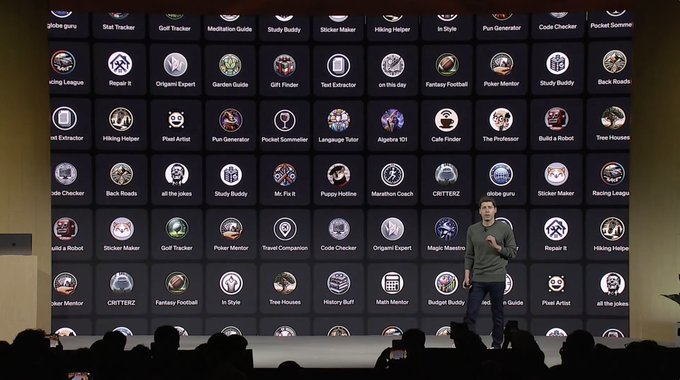ChatGPT is transformational — to put it lightly. The chatbot can code, write poetry, compose music and more in ways that impress human experts. Unless you’ve been living under a rock, you have probably explored various ways to leverage ChatGPT in one way or another. But OpenAI, the founding company of ChatGPT, has more to offer.
On 6 November 2023, OpenAI announced GPTs, a version of ChatGPT that is more helpful for people’s daily lives. The announcement delivers significant implications for businesses across industries. GPTs might change how you use AI chatbots, specifically ChatGPT, to streamline your workflow.
Let’s look at OpenAI’s GPTs, how they work, and their business potential.
What are GPTs?
GPTs are versions of ChatGPT that you can repurpose for specific business use cases – without coding. Like ChatGPT, GPTs are chatbots that can answer questions naturally as humans do. On top of that, GPTs can learn from instructions or documents you uploaded in natural languages. For example, you can create a GPT that helps you answer specific sales questions using updated product information.
To build your own GPT, use the newly introduced GPT builder and describe what you want the chatbot to do. Describe the instructions in everyday language, and a new GPT will be created almost immediately. You can also customise conversation-starter questions and other options by enabling or disabling them at the configuration tab.
For example, you can tell the GPT builder to create a new GPT to review software codes with ‘Make a virtual software buddy that helps me cross-check my codes. Then, provide suggestions on how I can optimise them for security, speed and scalability.’ You can also upload files to help the GPTs understand the specific task better.
If that’s not exciting enough, GPTs’ launch has several interesting updates.
Connecting GPTs with real-world data
Unlike ChatGPT, which relies on curated knowledge, GPTs can interact with real-world data. Developers can connect GPTs with external databases and information sources to enable more concise responses. For example, you can use a GPT that retrieves information from emails, product databases, or travel listings to build AI-powered virtual assistance.
GPT store
Given the ease of creating a custom GPT, there will be a growing community of GPT builders. OpenAI is launching a GPT Store, a marketplace that lets users publish and monetise their GPTs. This will encourage more users to share innovative GPT applications they built. Soon, you can browse GPTs created by the community and use them for your business.
Keeping privacy and safety in mind
When creating your own GPTs, you can allow or disallow OpenAI to refine their AI models with chat records. Generally, OpenAI is sensitive to user’s privacy and safety concerns. GPTs allow users greater control over data usage. Moreover, OpenAI has placed safeguards to prevent GPTs from showing harmful or unhelpful behaviours.
Third-party integrations
Custom GPTs allow you to integrate with external services with supported Application Programming Interfaces. This way, you can use GPT-generated responses to initiate specific actions. For example, you can connect GPT to Canva and ask the chatbot to render a drawing from the product description it provided.
GPTs: A game-changer in business AI applications
Before GPTs, businesses have repurposed generative AI for specific use cases by fine-tuning foundational models. Foundational models are machine learning algorithms trained with massive amounts of information. ChatGPT is a chatbot that uses a foundational model. On their own, these models can respond to customers naturally but lack knowledge of what a company offers.
So, companies engage machine learning engineers to fine-tune foundational models so they can use them to augment their businesses. Fine-tuning a model requires technical expertise and often involves coding. When fine-tuned, a language model can respond to the questions accurately with business-specific information. Sometimes, users feed ChatGPT a series of instructions to change its behaviour. We call this prompt engineering.
The problem is – fine-tuning a model takes time and resources. And it requires several tries before you get an AI assistant you can rely on. Likewise, prompt engineering requires keying in a list of instructions each time you want to use ChatGPT. With GPTs, you can produce an equivalent of a fine-tuned AI model without going through technical or repetitive processes.
Anyone can create a custom GPT instantly by telling it what to do in simple words. For CEOs and CMOs, GPTs means you can create your own versions of ChatGPTs in minutes. It helps you automate workflows, validate ideas, analyse data, and more without engaging AI experts from the go. You can save and publish the custom GPT for private or public uses. This accelerates market expansion, customer growth, profitability and other business indicators.
Which industries will be significantly impacted?
GPT will profoundly impact industries like previous AI technologies and change how businesses operate.
Retail and E-commerce
Retail businesses can leverage GPT to personalise customer journeys, which improves revenue growth and customer retention. For example, you can create a GPT that recommends products based on their historical purchases and preferences. Beyond that, retailers can integrate GPT with supply chain management, customer relationship management (CRM) and other operational software to automate sales workflows.
Education
Once wary of ChatGPT, educators are now adopting AI to make lessons more interactive and effective for students. With custom GPTs, teachers can create virtual classroom chatbots to craft personalised lessons, check submitted homework and assist in other educational tasks. Likewise, GPTs benefit self-paced learners by allowing them to track progress, complete assignments, and access new learning materials at their convenience.
Software
Software teams can rely on GPTs to review code, devise test cases, compile bug reports and more to develop better software in less time. GPTs are fundamentally a large language model, which means they are exceptionally capable of analysing structured data. You can create GPTs that double up as a programming buddy to capture software issues early in the development. Software companies can avoid the unnecessary expenses of fixing bugs after an app is deployed.
Healthcare
Healthcare providers strive to improve care delivery while achieving positive business outcomes. With GPTs, medical practitioners can streamline clinical workflows to deliver prompt treatment, transparent communication, and efficient billing processes. Meanwhile, pharmaceutical firms can use GPTs to support drug research and coordinate clinical trials. For example, researchers can upload volumes of medical literature to a custom GPT to facilitate the development of new drugs.
Real estate
Both real estate agents and prospective buyers will benefit from the flexibility that GPTs offer. Real estate agencies can customise a virtual assistant for preliminary negotiations before sending qualified leads to a human agent. For buyers, a GPT chatbot can help them filter through property listings just by describing their desired home.
How should you prepare?
OpenAI’s custom GPTs introduce new possibilities and remove significant hurdles in repurposing generative AI for businesses.
Explore opportunities
Besides creating variations of ChatGPTs to engage your customers, these custom chatbots are equally useful in supporting internal workflows. For example, you can create custom GPTs to analyse and predict revenue growth based on previous earning reports.
Bring your people with you
To make the best of GPTs, you must identify business processes that benefit from generative AI automation. Bring all stakeholders, executives and business users on board to ensure they share a common understanding of what integrating GPTs will entail. Remember, AI adoption requires a balance of awareness, education, implementation and accountability.
Use GPTs responsibly
Be mindful that employees and customers may share ethical and privacy concerns when powerful AIs like GPTs are brought into the equation. Also, GPTs are not perfect and inherit flaws like hallucinations from ChatGPT. As much as the excitement it brings, use GPTs wisely to support your business and apply appropriate safeguards.
The bottom line
GPTs marked the next major step in OpenAI’s ambition to democratise artificial intelligence for the public. By allowing users to build and publish their own versions of ChatGPT, OpenAI unlocks a new chapter in generative AI that businesses can benefit from. When used wisely, GPTs can innovate your business in smarter and faster ways.
We’re already successfully using AI on a range of client projects with exceptional results. Be prepared for the exciting journey ahead. Talk to us if you need more help with custom GPTs.

